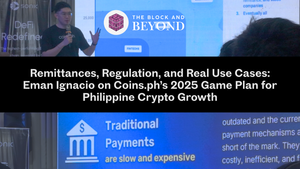Blockchain is expanding beyond crypto, but which industries are adopting it the fastest?
Blockchain is finding practical applications in industries that require immutable and transparent record-keeping beyond just cryptocurrency. From financial transactions to supply chain logistics, gaming assets, and public governance, businesses and institutions are beginning to adopt blockchain to improve security and accountability.
According to Michael Lance Domagas, a veteran in the blockchain and technology space and a member of the Blockchain Council of the Philippines (BCP), blockchain’s potential is particularly evident in finance, supply chain management, gaming, and public services.
“Since Bitcoin is seen as the progenitor of blockchain applications, I see the potential of blockchain to help finance financial institutions.”
Finance: Enhancing Transparency and Security
The financial sector has been at the forefront of blockchain adoption, leveraging its decentralized nature for increased security and efficiency. Blockchain’s ability to ensure data integrity and immutability makes it an ideal solution for financial transactions, reducing the reliance on centralized databases.
“What blockchain can offer to the finance industry is the integrity, immutability, and transparency of decentralized technologies, versus a monolithic, centralized hub as the source of all information.”
For developers looking to enter this space, proficiency in smart contract development and security auditing is crucial. Knowledge of Solidity, Rust, and cryptographic principles will help in building secure financial applications.
Supply Chain: Increasing Visibility and Trust
Supply chain industries often rely on enterprise resource planning (ERP) systems to manage inventories, but blockchain can enhance these processes by providing greater visibility in transactions. This is particularly useful when dealing with third-party partners, ensuring trust and accountability.
“Supply chain industries typically use enterprise resource planning (ERP) in managing inventories. However, visibility is important when transacting with third-party partners. This is where blockchain comes in, to provide more transparent transactions.”
Developers interested in supply chain applications should focus on blockchain frameworks like Hyperledger Fabric and enterprise-grade smart contract development.
Gaming: Digital Ownership and Asset Security
The gaming industry is rapidly integrating blockchain technology, particularly for digital asset ownership. Through blockchain, in-game items can have real-world value and be securely traded between players, ensuring authenticity and permanence.
“In entertainment and gaming, representation of digital assets and in-game items in the outside world is important. Blockchain provides immutability and persistence across platforms to vet for the ownership of any asset. This also holds true for creative artworks where non-fungible tokens (NFT) can provide authentication for any work of art.”
Developers in the gaming sector should familiarize themselves with NFT standards, smart contract development, and blockchain gaming platforms like Immutable X and Polygon.
Public Services: Transparency and Fraud Prevention
Blockchain has the potential to revolutionize public services by improving transparency in land registration, taxation, and government transactions. It can provide a secure and tamper-proof system for verifying records and preventing corruption.
“What is a game-changer for me is the application of blockchain into public service. Land titles require a more robust mode of authentication, especially when real-estate properties are getting more valuable. The principle of public notaries, which is a form of witnessing and verification that a document exists serves as an inspiration for blockchain. Taxation and disbursement of budget can be monitored transparently by blockchain, to deter fraud, corruption, and malversation of funds.”
For developers, working in this sector requires an understanding of government compliance requirements, privacy-focused blockchain solutions, and secure identity verification methods.
The increasing adoption of blockchain across industries creates opportunities for developers specializing in smart contracts, security, and decentralized applications. Understanding industry-specific needs, choosing the right blockchain protocols, and mastering relevant programming languages are key steps toward a successful career in blockchain development.











